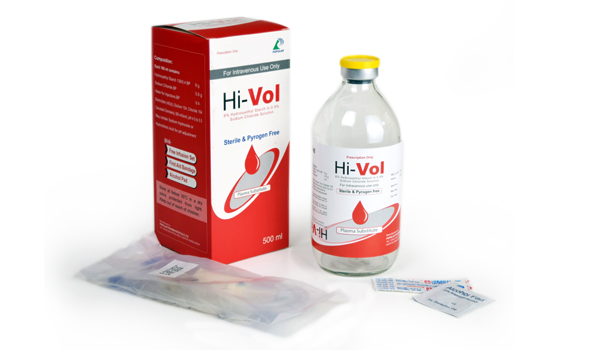Indication
Hi-Vol is indicated for the treatment and prophylaxis of hypovolemia in adults and children. It is not a substitute for red blood cells or coagulation factors in plasma.
Dosage & Administration
Hi-Vol is administered by intravenous infusion only. The daily dose and rate of infusion depend on the patient’s blood loss, on the maintenance or restoration of hemodynamics and on the hemodilution (dilution effect). It can be administered repetitively over several days.
The initial 10 to 20 ml should be infused slowly, keeping the patient under close observation due to possible anaphylactoid reactions.
Adult Dose:
Up to 50 ml of Hi-Vol per kg of body weight per day (equivalent to 3 g Hydroxyethyl Starch and 7.7 mEq Sodium per kg of body weight). This dose is equivalent to 3500 ml of 6% Hydroxyethyl Starch 130/0.4 in 0.9% Sodium Chloride for a 70 kg patient.
Pediatric Dose:
The dosage of Hi-Vol in children should be adapted to the individual patient colloid needs, taking into account the disease state, as well as the hemodynamic and hydration status.
For newborns to infants (<2 years), a mean dose of 16±9 ml/kg of body weight per day.
For the children from 2-12 years of age a mean dose of 36±11 ml/kg of body weight per day. The dose in adolescents >12 is the same as the adult dose.
Use In Pregnancy
Pregnancy category C. It has been shown to cause embryocidal or other adverse effects in rats and rabbits when given in doses 1.7 times the human dose. There are no adequate and well-controlled studies in pregnant women. It should be used during pregnancy only if the potential benefit justifies the potential risk to the fetus.
Use During Lactation
It is not known whether Hydroxyethyl Starch (HES) is excreted in human milk. Because many drugs are excreted in human milk, caution should be exercised when it is administered to a nursing woman.
Precautions
Anaphylactoid reactions: Anaphylactoid reactions (mild influenza-like symptoms, bradycardia, tachycardia, bronchospasm, non-cardiac pulmonary edema) have been reported with solutions containing Hydroxyethyl Starch. If a hypersensitivity reaction occurs, administration of the drug should be discontinued immediately and the appropriate treatment and supportive measures should be undertaken until symptoms have resolved. Renal dysfunction: Avoid use in patients with pre-existing renal dysfunction. Discontinue use of this product at the first sign of renal injury. Continue to monitor renal function in hospitalized patients for at least 90 days. Coagulopathy: Monitor the coagulation status of patients undergoing open heart surgery in association with cardiopulmonary bypass as excess bleeding has been reported with Hydroxyethyl Starch solutions in this population. Discontinue use of this product at the first sign of coagulopathy. Fluid equilibrium: Avoid fluid overload; adjust dosage in patients with cardiac or renal dysfunction fluid status and rate of infusion should be assessed regularly during treatment, especially in patients with cardiac insufficiency or severe kidney dysfunction. In cases of severe dehydration, a crystalloid solution should be given first. Generally, sufficient fluid should be administered in order to avoid dehydration. Monitoring: Laboratory tests: Clinical evaluation and periodic laboratory determinations are necessary to monitor fluid balance, serum electrolyte concentrations, kidney function, acid-base balance, and coagulation parameters during prolonged parenteral therapy or whenever the patient’s condition warrants such evaluation. Monitor liver function in patients receiving Hydroxyethyl Starch products.

